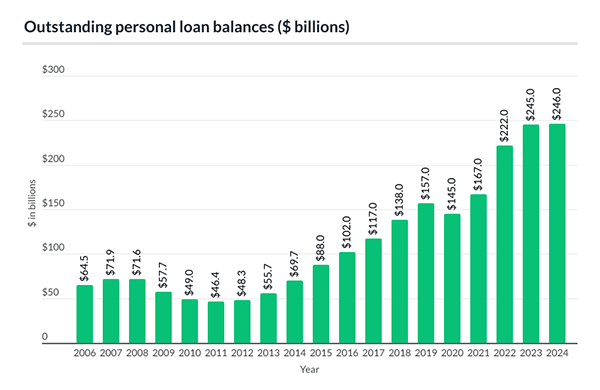With every personal loan comes an element of surprise, which can even be ill-suited to you if you don’t deeply understand the technical details or the terms and conditions involved.
Therefore it’s always pivotal to know the necessary things that you compulsorily need to know before you apply for a personal loan.
This will not only help you avoid potential problems but also allow you to be better prepared to make a wise decision. Also, learn about DSCR Loan Requirements by reading this article.
This blog post has provided you with the relevant and necessary information with regard to personal loans such as the interest rates, repayment methods, and so on things to assist you in making up your mind if you should go for a personal loan or not.

Understanding Personal Loans
Personal loans are a type of installment loan with a fixed rate and monthly payment and are offered by banks and similar financial institutions without taking collateral security.
People often choose this for purposes including, paying off bills, vacationing, or making other large purchases.
However, compared to other loan types such as auto or property, personal loans do not require any assets as security.
These are given for short periods only, so you have to repay them with some money paid as interest on the loan over some agreed period.
Suppose you have an emergency that requires you to raise a considerable sum of money quickly, then you should go now and take a personal money loan that is likely to be a successful option.
Therefore, in any case, when you plan to take out a personal loan, you should also consider the terms related to this, for example, the APR, the time for which you will be able to borrow, and other expenses.
Do You Know?
The first loan the World Bank made, in 1947 to Credit National of France for $250 million, is also the first loan to be sold.
Importance of Credit Score
Your credit score is a significant factor that determines your eligibility for a personal loan since it is collateral-free.
The lender uses your credit score to evaluate your creditworthiness and the likelihood that you’ll repay the loan in a timely manner.
Also, the higher your credit score, the more likely the vendor will approve your application, and offer more favorable terms such as a lower interest rate, however, a lower score might result in higher interest rates or even loan denial.
Therefore, before applying for a personal loan, you must wisely check your credit score and take steps to improve it if necessary.
This can also involve paying off outstanding debts and making timely payments that can help boost your score.
Comparing Interest Rates
One of the most vital aspects of taking a personal loan is understanding the interest rate you’ll be charged.
Interest rates can vary significantly between lenders, so it’s necessary to shop around and compare rates to ensure you’re getting the best deal.
Also, bear in mind that the interest rate offered to you will depend on your credit score, income, and other factors.
In addition, some lenders may offer fixed interest rates, which remain constant throughout the loan term, on the other side others provide variable rates that can fluctuate based on market conditions.If you’d like to compare different offers and find the best options, you can explore tibi loans.
Evaluating Repayment Terms
Before you choose any personal loan, you must evaluate the repayment terms and ensure they align with your financial situation.
These repayment terms can vary from a few months to several years, and choosing a longer term can lower your monthly payments but may increase the overall interest you’ll pay.
Conversely, a shorter term can lead to higher monthly payments but save you money in interest.
Therefore, be sure to review the loan agreement carefully and take note of any prepayment penalties that could apply if you decide to pay off the loan early.
Assessing Fees and Charges
When considering a personal loan, always be aware of any fees and charges that may apply.
These can include origination fees, which are charged by the lender for processing the loan, and late payment fees if you miss a payment.
Some lenders may also charge prepayment penalties if you repay the loan before the end of the term.
Hence, understanding these fees and charges can help you accurately calculate the total cost of the loan and avoid any surprises down the line.

Considering Alternatives
Personal loans can indeed be a useful financial tool but before committing to this type, it’s always good to explore the other options available so that you can be sure what suits you best.
In the financial loan market, there are quite a few alternatives available such as credit cards, home equity loans, or borrowing from friends and family, etc., and the one you decide to select must meet your financial situation and its needs.
In order to make a valuable choice, analyze the advantages and disadvantages of each alternative mentioned if they align with your long-term financial goals or not.
However, consulting with a financial advisor can also provide valuable insights and help you make an informed decision.
For those who may be considering alternatives to traditional personal loans, short-term borrowing options such as payday loans can offer quick access to funds for urgent needs. Platforms like DotDotLoans allow you to compare and apply for payday loans online, with the flexibility to borrow between £100 and £5,000, depending on your requirements. This can be a helpful solution if you require fast funding and want instant decisions from lenders, but it’s essential to review the repayment terms closely before proceeding.
Making an Informed Decision
Taking a personal loan is a big financial deal, and thus demands a wise decision when choosing one.
As said, “A good decision is based on knowledge and not on numbers,” by educating yourself on the concept of personal loans, the importance of your credit score, comparing interest rates, evaluating repayment terms, assessing fees and charges, and considering alternatives, you can confidently decide if a personal loan is the right choice for you or not.
You can help yourself by learning about the loan agreement carefully and asking questions about the terms or conditions that you might be unsure about.

As you go through this blog, it must be understood that taking a personal loan requires careful consideration and a thorough understanding of the various factors involved.
When you educate yourself about personal loans and their implications, you help yourself make wise and informed decisions that meet your financial goals and prevent you from potential pitfalls.
So, if you go ahead with a personal loan, take the time to research and compare options, evaluate your financial situation, and weigh the advantages and disadvantages.
This approach will help you make the best decision for your unique circumstances and ensure a smoother borrowing experience.





